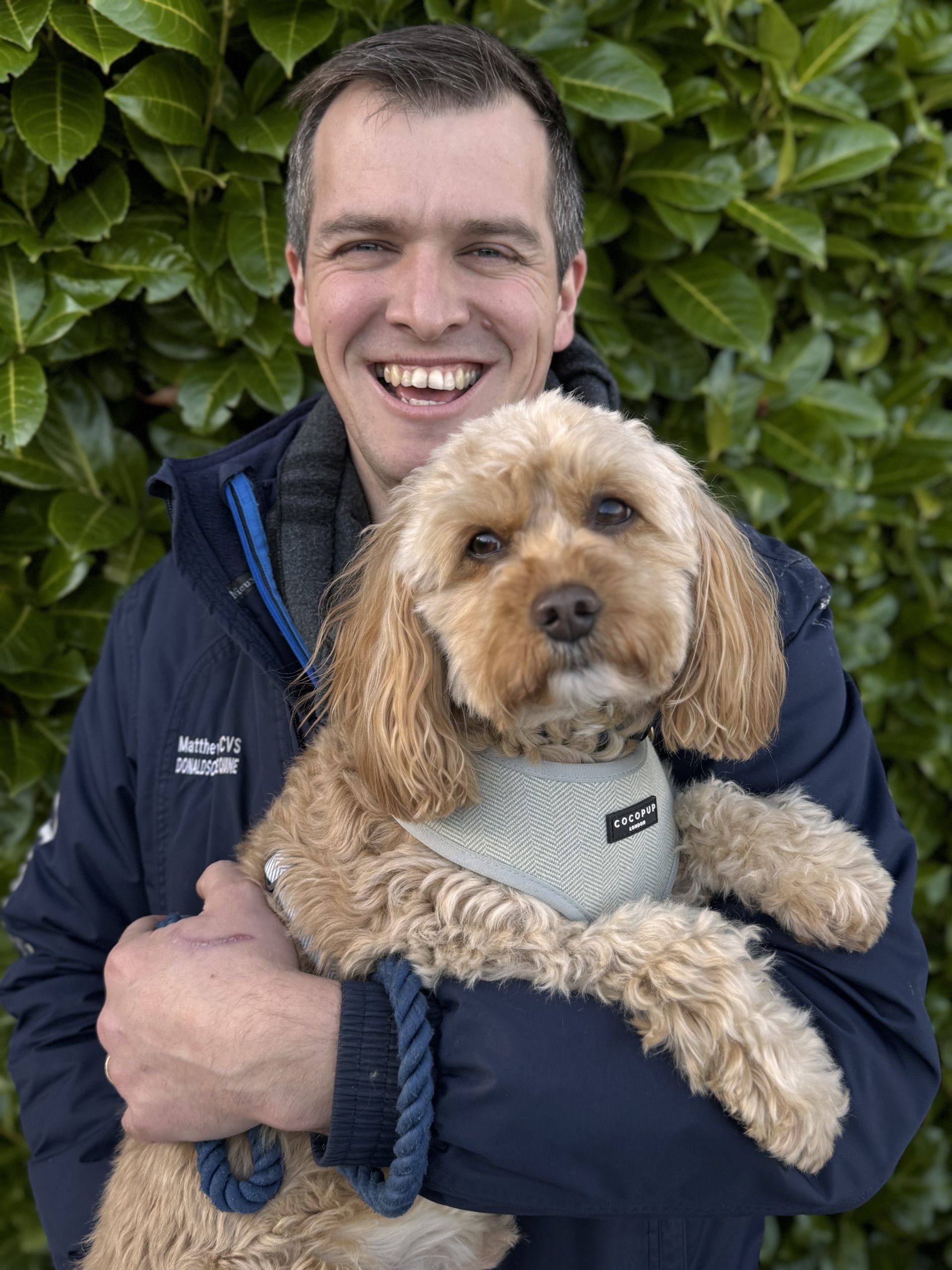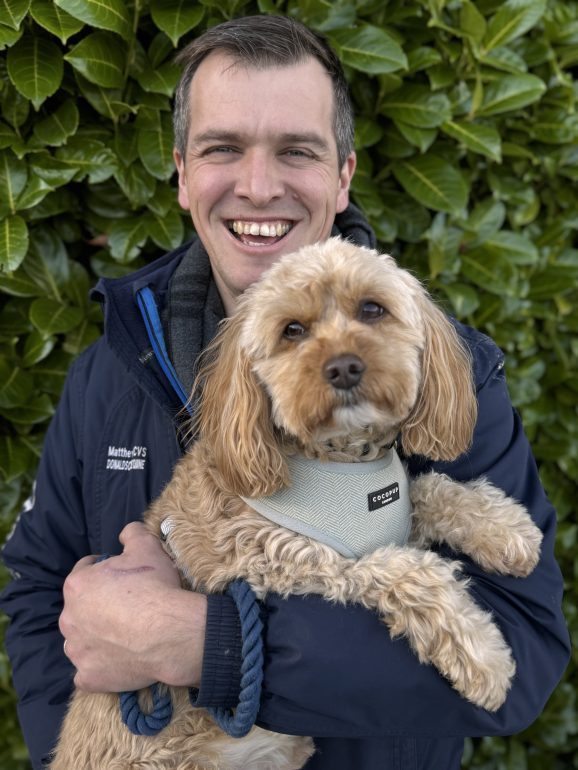Listeners:
Top listeners:
-
 play_arrow
play_arrow
Rother Radio (128K) Love Local, Love Music!
-
 play_arrow
play_arrow
Rother Radio (64K) Love Local, Love Music!
-
 play_arrow
play_arrow
Rother Radio (Doncaster) (128K) Love Local, Love Music!
-
 play_arrow
play_arrow
Rother Radio Xmas Love Local, Love Music!
-
 play_arrow
play_arrow
Rother Radio – Special Announcement Love Local, Love Music!
TV vet warns pet owners to avoid Christmas chaos by keeping festive hazards away from furry friends
today19/12/2024

TV’s ‘The Yorkshire Vet’ Matt Jackson-Smith, is warning pet owners to make sure their animals keep their paws off festive fayre to help avoid Christmas chaos and emergency trips to the vet.
Mince pies, Christmas pudding and even seasonal ornaments such as tinsel and festive plants like holly may seem like innocent, yummy treats or decorations; however, for pets, they are tempting but potentially deadly. The last thing anyone wants to do at Christmas to make preventable, emergency trips to the vet but while the odd mince pie or square of chocolate from an advent calendar may not seem like a serious risk, the consequences could be devastating.

Theobromine in chocolate, raisins and other dried fruit – found in mince pies or Christmas puddings – onion, garlic, the sweetener xylitol and seasonal decorations like mistletoe and holly can all be dangerous, and even fatal, to dogs and cats if eaten.
Mixed practice vet Matt Jackson-Smith, who stars in Channel 5’s show The Yorkshire Vet, sadly has plenty of stories about pets whose cheeky appetite or curiosity of a Christmas tree got them into trouble.
He said: “It’s that time of year again when vets are stocking up their medication cupboards to deal with all sorts of festive hazards. I’ve lost count of how often I have had to make dogs sick after they’ve eaten chocolate by the bucketload or have had to remove tinsel which has become lodged where it shouldn’t!
“It’s best to keep festive treats and decorations out of reach from dogs, cats and other pets and to keep a close eye on what they eat over the holidays. I have a one-year-old at home, and it has certainly taught me to be even more wary of little ones in particular! Our daughter loves to give dog treats to our cavapoo Harry, so just like everyone else we will be watching to make sure they are the right ones and that Harry can enjoy his Christmas just as much as us, with no emergency trips to the vet!
“It’s also not just festive-themed items to be aware of but also common, winter-long hazards like antifreeze. It is particularly tasty to dogs and cats – but also incredibly toxic and damaging for their kidneys.”
Sadly, it’s not uncommon for pets to bite off more than they can chew at Christmas. BVA Voice of the Veterinary Profession research shows that four in five companion animal vets saw at least one case of toxic ingestion over the 2021/2022 festive period in dogs and cats, with cases varying from dogs with chocolate poisoning to cats who have eaten seasonal plants or ornaments.
The festive season is full of joy, but it also comes with hidden dangers for our furry friends. Here are Matt’s tips to help ensure your pets have a safe and happy holiday:
Festive food
Many festive foods are toxic to pets so it’s important to keep them away from your animals and to let your guests know the dangers too. Common culprits include:
- Chocolate (which contains the toxic component theobromine), raisins, grapes, and currants, such as those found in Christmas puddings or mince pies, onions, garlic and leeks, which can be found in gravy and stuffing, are really toxic to dogs and cats.
- Fatty, rich foods can trigger sickness and diarrhoea or other conditions such as gastroenteritis and pancreatitis, so don’t be tempted to share your Christmas dinner.
- Alcohol is extremely harmful to pets’ liver and nervous systems.
Decorations and wrapping
- Tinsel, tape, bows and ribbons can cause blockages if ingested, which may require emergency surgery.
- Glass or plastic baubles, sharp-edged decorations and fairy lights can cause injuries if broken or chewed.
- Avoid edible – or potentially edible – decorations like chocolate ornaments.
- Candles should be kept away from curious paws and wagging tails to prevent burns or fires.
- Don’t keep wrapped food presents under the tree where pets can sniff them out
Christmas trees
- Using a sturdy base or anchor the tree to a wall to stop it toppling over
- Block off access to your pet if they show too much interest
Beware of Toxic Plants
- Eating poinsettias, holly and mistletoe can lead to vomiting, diarrhoea, and even heart issues.
- Lilies are extremely dangerous for cats all year round, even in tiny amounts.
- Opt for pet-safe alternatives like artificial plants or vet-approved greenery.
Create a Safe Space
- Providing a quiet room with their bed, toys, and water for them to retreat to can help reduce stress.
- Advise guests to give your pet space when they are resting.
- Stick to your pet’s usual routine, including their normal food, exercise and sleeping schedules
Cold weather hazards
- Antifreeze is extremely poisonous. Clean up any spills immediately.
- Salt and grit should be washed off your pet’s straight away after walks to prevent irritation or ingestion of harmful substances.
If in doubt, call your vet
Even with all the care in the world, animal accidents and emergencies can still happen. If you’re concerned or unsure if your pet has consumed something they shouldn’t, it’s best to call your vet to get advice to make sure. Make sure you’re prepared by checking your vet’s emergency cover provision and holiday opening hours
Written by: Rother Radio
Similar posts
Now Playing
Now playing: -
On Air Now

Eric Vickers
The Saturday Afternoon Show
Join Eric Vickers on Saturday Afternoons from 1pm as he plays the best variety of hits across Rotherham and Sheffield.
closeSponsored
Weather
Upcoming Local Event
Latest from Facebook
Search Rother Radio
Contact Us
- https://www.rotherradio.co.uk
- 01709 257 175
- studio@rotherradio.co.uk
About Us
Rother Radio – Love Local, Love Music! → Discover more
Our Partners
Rother Radio is owned by Rotherham Broadcasting CIC






